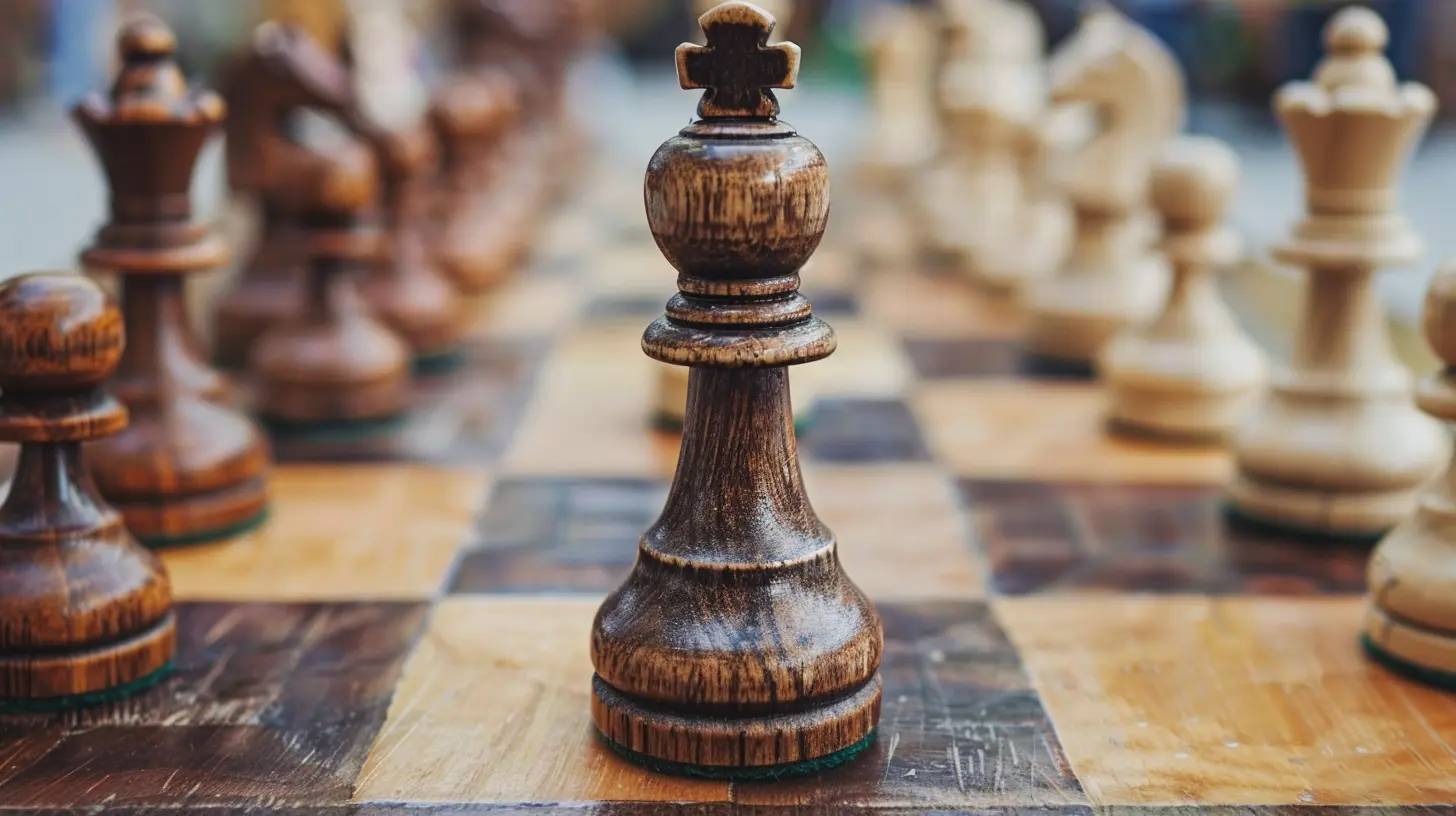How to Develop a Flexible Strategy in an Ever-Changing Game Environment
14 November 2025
If there’s one thing all gamers can agree on, it’s this: gaming is unpredictable. Whether you're dominating the battlefield in an online shooter, exploring the dungeons of an RPG, or strategizing in a real-time strategy game, the environment is constantly evolving. It’s like trying to build a sandcastle while the tide is coming in—it’s never the same twice.
But that’s exactly why we love gaming, right? The dynamic challenges, the thrill of adapting on the fly, and the satisfaction of outsmarting your opponents. Yet, for all the fun, staying competitive in a constantly changing game environment isn’t easy. That’s where having a flexible strategy comes in.
So, how do you create a plan that can bend but won’t break? Grab your favorite beverage, and let’s dive in!
Why Flexibility Matters in Gaming Strategy
First off, let’s answer the big question: why does flexibility even matter? Can’t you just stick to one tried-and-true strategy and ride it all the way to victory? Well, not quite.Most games, especially multiplayer ones, are like living, breathing ecosystems. Developers are rolling out patches, balancing characters, and tweaking mechanics. Players themselves are constantly evolving too—new metas emerge, strategies that worked yesterday are countered today, and innovative tactics appear out of nowhere.
Think of it like sports: if a football team only sticks to one play, their opponents learn to shut it down. The same concept applies to gaming. Being flexible means staying ahead of the curve, adapting to changes, and ensuring that no matter what’s thrown your way, you’re ready.
Step 1: Know the Game Inside Out
Alright, first things first—know your stuff. You can’t be flexible if you don’t understand the game’s core mechanics. Take the time to really dive deep:- Understand Game Mechanics: Learn how the game works at a fundamental level. What are the rules? What mechanics can you exploit? For example, in games like League of Legends or Dota 2, knowing cooldowns, item timings, and map objectives is crucial.
- Stay Updated: Developers love shaking things up. Regularly check patch notes, updates, and news. A single nerf or buff can drastically shift the meta. Remember when Fortnite added construction hammers? Total game-changer!
- Research the Meta: While the meta isn’t everything, it often reflects the strategies that currently dominate the game. However, here’s the catch—don’t just follow the meta blindly. Use it as a guideline, not gospel.
The more you know, the better equipped you are to pivot when needed.
Step 2: Embrace Experimentation
Ever heard the phrase, "You miss 100% of the shots you don’t take"? Yeah, that applies here too. Flexibility thrives on experimentation. Don’t be afraid to test out new strategies—even if they seem a little wild.- Try New Roles or Characters: If your go-to main gets nerfed, that’s not the end of the world. Expand your skills by experimenting with other roles or characters. In Overwatch, for instance, being proficient with both a tank and a support hero gives you a serious edge.
- Switch Up Playstyles: Are you an aggressive player? Try playing defensively for a change. It’ll not only make you versatile but also help you understand how other playstyles operate—making it easier to counter them.
- Analyze Failures: Not every experiment will work, and that’s okay. In fact, failure is one of the best teachers. After every loss, ask yourself: what went wrong? Was the strategy flawed, or was it the execution?
Remember, even the most successful players started as noobs experimenting with random ideas.
Step 3: Adapt to Opponents in Real-Time
Here’s where things get spicy—real-time adaptability. You’re in the middle of a match, and your opponents are pulling off strategies you’ve never seen before. What do you do? Panic? Nope. You adapt.- Read the Room: Pay attention to your opponents’ strategies. Are they focusing on a particular objective? Do they have a player carrying the team? Gather as much information as possible.
- Counter Their Moves: Once you know what they’re up to, start thinking of ways to counter it. If they’re playing aggressively, consider baiting them into traps. If they’re camping, find ways to outmaneuver them.
- Communicate with Your Team: In multiplayer games, communication is key. Share what you observe with your team and brainstorm a new approach together. Even a simple “stick together” strategy can flip the tide in your favor.
Adapting in real-time might feel overwhelming at first—it’s like trying to rebuild a plane while it’s flying. But over time, it becomes second nature.
Step 4: Build a Diverse Skill Set
Let’s face it: being a one-trick pony won’t get you far in an ever-changing game environment. The key is versatility. The more tools you have in your toolkit, the easier it is to adapt.- Master Multiple Playstyles: Whether it’s sneaky stealth, calculated strategy, or full-blown aggression, the more playstyles you master, the more unpredictable you become.
- Learn from Other Players: Watch streamers, study replays, and even observe your opponents. You’d be surprised how much inspiration you can gather from others.
- Train Consistently: Skills get rusty over time. Even if you’re familiar with a current meta or playstyle, practice regularly to stay sharp.
Developing a wide range of skills is like being prepared for any weather. Whether it’s a sunny day or a downpour of enemies, you’ll be ready.
Step 5: Stay Mentally Flexible
Here’s the thing: flexibility isn’t just about strategy—it’s also about mindset. Games are stressful. When you’re getting pummeled by opponents or your team isn’t cooperating, it’s easy to lose your cool. But keeping a clear head makes all the difference.- Stay Positive: A defeat isn’t a dead end—it’s a stepping stone to improvement. Learn to see losses as opportunities to grow.
- Be Open to Change: Sometimes, your favorite strategy just doesn’t cut it anymore. That’s okay! Learn to let go of old habits and embrace new ones.
- Balance Aggression and Caution: Being rigidly aggressive or overly defensive limits your options. Learn when to push and when to pull back—it’s a constant balancing act.
Think of your mental flexibility like a rubber band. It can stretch and bend under pressure but still snap back into shape.
Common Pitfalls to Avoid
By this point, you’re armed with tons of tips. But even the best gamers fall into traps. Let’s talk about what NOT to do:- Over-Committing to the Meta: While the meta is helpful, putting all your eggs in one basket can backfire when the game evolves.
- Ignoring Communication: You might be the best player on your team, but if you’re not coordinating with others, teamwork collapses.
- Being Overconfident: Flexibility requires humility. No matter how skilled you are, there’s always room for improvement.
Avoiding these pitfalls ensures you’re truly adaptable, not just reactive.
Bonus Tips for Staying Ahead of the Game
- Follow updates and patch notes religiously.- Join gaming forums or communities to discuss strategies and share insights.
- Watch professional esports matches to learn advanced tactics.
- Use training modes to test out new ideas before bringing them into actual games.
The goal is to stay one step ahead of the curve. Remember, even a slight advantage can snowball into a massive lead.
Conclusion
Developing a flexible strategy in an ever-changing game environment isn’t just a skill—it’s an art. By understanding the game, experimenting, adapting, and staying versatile, you can handle whatever curveballs the game and your opponents throw at you. Sure, it takes effort. But isn’t that what makes victory so sweet?So next time you’re loading into a match, remember this: flexibility is your secret weapon. Keep your strategies fluid, your mindset open, and your skills sharp. Who knows? You might just become the player everyone fears and respects.
Good luck, and may the games be ever in your favor!
all images in this post were generated using AI tools
Category:
Strategy GamesAuthor:

Audrey McGhee
Discussion
rate this article
2 comments
Patience McGowan
This article offers valuable insights into adapting strategies in dynamic gaming landscapes. By emphasizing flexibility and awareness of changing elements, it equips players with essential tools to enhance their gameplay and decision-making abilities effectively. Great read!
February 15, 2026 at 6:01 PM
Laura McCracken
Great insights on adapting strategies in dynamic gaming environments! I appreciate the emphasis on flexibility and innovation. This article will definitely help players enhance their approach to evolving challenges. Thank you for sharing!
November 23, 2025 at 4:27 PM

Audrey McGhee
Thank you for your kind words! I'm glad you found the insights helpful for navigating dynamic gaming challenges. Happy gaming!


